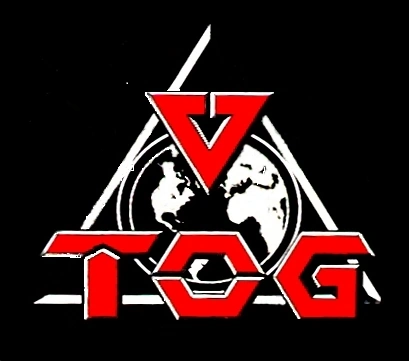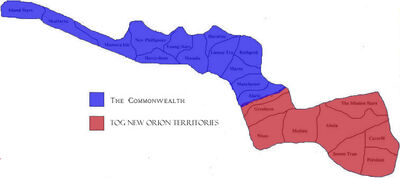The political organization of the Commonwealth is based on the parliamentary systems common to Earth and other human worlds before the Snow Plague and subsequent slavery. Each world has a House of Commons and House of Lords, with a Prime Minister chosen from the House of Commons to head the government. A Baron, appointed by the Count or Duke of the area, oversees the Prime Minister and insures a lack of despotic rule.
Counts administer the Commonwealth on the County level and Dukes handle business on the Dukedom level. On New Britannia, the capital of the Commonwealth, the "first citizen" is titled the Regent and administers the entire government. With each of these upper levels of the government, the nobles meet in a House of Lords and elect their representatives to the next level, culminating with the Grand Dukes electing the Regent.[1]
How does this work?[]
At the planetary level:[]
Unlike TOG worlds, local (town, city, municipality, “state” or region) government is independent of planetary government, though often these lesser governments resemble the local planetary parliament.
Each Planetary Parliament, sometimes referred to as a “World Parliament” or “System Parliament” (when political regions exist off-world in the same system, but none has its own independent planetary parliament), is composed of two chambers; the House of Lords and the House of Commons; we’ll look at each in turn.
The House of Commons is composed of Representatives elected by the planetary population through popular vote; each world determines its own method of election and the length of term of each Representative; some worlds hold planet-wide elections for a fixed number of seats, with members serving terms of up to 17 years (a limitation enacted by the First Regent to abolish life terms), with no limit to the number of terms served, while other worlds elect multiple representatives from each municipality, serving terms of a single year with a ban on multiple terms. Some worlds have different term lengths for their Representatives, ensuring a continuation of government, while others have full elections every few years, with the possibility of an all-new House of Commons every election.
The size of the Lower House (what the House of Commons is often called) also depends on world, from under 100 to thousands. Regardless of its form or its size, the House of Commons elect one of its own as Prime Minister to lead the government. In some worlds, the Prime Minister (PM) has vast discretionary powers, while in others the PM is a puppet of Parliament. Some worlds allow the PM to propose legislation, while others limit a PM’s legislative ability to suggestions and veto power.
PM’s walk a fine line; they can be removed from the position by the Representatives that elected them and their ultimate authority is kept in check by the planetary Baron.
The Planetary House of Lords, also known as the “Upper House”, is NOT an elected body; its members are the Peers of the Realm; individuals holding (mostly) hereditary titles, obtained though deed by their ancestors, or by themselves; most often, these are leaders of industry and their title is most often Baron or a local equivalent, though not all Barons are the same; The title “Baronet” (unlike in old Earth, the Commonwealth uses it as a hereditary title for Peers) may be granted on an individual by the House of Lords (as opposed to the local Count or higher authority); it is also used as an honorific for the designated non-titled noble representing a Count or higher in lieu of the actual titled noble (usually in cases of infirmity or absence and always at the discretion of the Upper House).
Counts, Dukes and other “higher” levels of nobility also serve in the Planetary House of Lords, provided that they have their primary residence on the planet. These are individuals who no longer serve at the County or Dukedom level or who inherit said titles.
The Upper House can propose and pass bills, which must be ratified by the Lower House and vice-versa, but the most important duty of the Upper House is to elect one of its members to the County-level House of Lords; this member is granted the title of Count (which may be inherited by his or her heirs) and represents the Planet at the County level. Conversely, the Upper House may recall a Count that is perceived to not be representing the world in a satisfactory manner.
In many ways, a Count serving at the County level is similar to a Clarissimi Senator in a TOG Provincial Senate; the main difference being that the Clarissimi has absolute power over his world, while the serving Count is limited to appointing a Baron to maintain veto power over the planetary Prime Minister (by tradition, this Baron is selected from outside the ranks of Planetary Peers, though often this means that the heir of a Peer is selected who will inherit their own title in short order)… and serving as a sitting Peer at the planetary Upper House (though most frequently they send a representative; usually a son or daughter expected to follow in their footsteps).
The Upper House is administered by the Lord Chancellor; a non-voting Peer appointed at the pleasure of the serving Count; he or she calls meetings to order and arbitrates debates and topics. This is a position of highest trust and the Lord Chancellor often serves until retirement at the pleasure of multiple serving Counts.
At the County level:[]
The County House of Lords (sometimes erroneously referred to as the “House of Counts”) meets at the County Capital World; usually centrally located in a County, for practical travel and VLCA purposes (where practical, Counts may use VLCA to fulfill their obligations; unlike TOG, there is no requirement that they physically travel to the County Seat, though it is difficult to conduct the business of government this way).
There is no “Lower House” at the County level; the House of Lords manages county-level matters and ratifies legislation passed at the Ducal level. They also select one among their number to serve as their representative to the Ducal House of Lords, granting them the hereditary title of Duke. Likewise, they can recall a Duke that is not serving their interests satisfactorily.
Some liken serving Dukes (the title is technically gender-neutral, but female Dukes may choose to be called “Duchess”) to Spectibles Senators in TOG, but this is not at all accurate; though they function at similar administrative levels, the similarities end there; the Duke leads the County House of Lords through his two appointments: the High Chancellor (equivalent of the Lord Chancellor at the planetary level) and the Ducal Speaker, who represents the Duke when the Duke is absent, but even here, the Duke’s powers are severely limited.
The title of Duke is hereditary, with non-serving Dukes often serving alongside other Peers at Planetary and County Houses of Lords. Ducal families tend to take their titles seriously and often a Duke is elected as a serving Count or as a serving Duke, maintaining power in the same family.
The planetary region surrounding the County Capital City is designated a “County District” and is technically independent of the rest of the planet, with its own utilities, police and government services and more often than not, its own dedicated spaceport.
At the Dukedom Level:[]
The Ducal House of Lords meets at the Ducal Capital, which often is a County Capital, to “handle business on the Dukedom level” (BTW: technically, “Duchies” are sub-regions of a Dukedom, but with the advent of VLCA technology, this archaic term was abandoned). Like County Capitals, the region surrounding the Ducal Parliament building is a region independent of planetary rule, with its own services and starport… usually with massive military facilities nearby.
The Ducal House of Lords elects a Grand Duke from among their number to represent the Dukedom at the Commonwealth-level Grand Parliament. Recalling a Grand Duke is significantly harder to do than recalling a Duke, since it requires ratification by simple majority of the County-level Houses of Lords: the decision does not fall to the Dukes themselves; they present their County Parliaments with the bill, which must be approved by simple majority of each County House of Lords; if a simple majority of these parliaments pass the resolution, then the Dukes may recall the Grand Duke.
Like lower Houses of Lords, the Ducal Parliament is convened by a Lord High Chancellor (LHC) appointed by the Grand Duke. Unlike lower Houses, the LHC can speak for the Grand Duke and even introduce legislation, but cannot vote except by proxy.
The Title of Grand Duke is NOT hereditary, though the land grant that comes with the title is.
At the Commonwealth level:[]
At New Brittania, Capital World of the Commonwealth, the Grand Dukes meet at the Commonwealth Grand Parliament (also known as the Commonwealth House of Lords) in the Commonwealth District, an independent region of the planet surrounded by military bases.
At the magnificent Parliament Palace, the Grand Dukes meet and conduct business, which includes electing one of their own as Regent (also known as “first citizen”, but this is an informal title that has been falling out of favor for decades). One of the perks of being Regent is that the Regent gets to pick his replacement as Grand Duke from among the other Dukes of his or her Ducal Parliament, meaning that there is almost always one Grand Duke who is loyal to the Regent.
A Regent in power is accorded the title of Prince, which is not hereditary, but is bestowed as an honorific upon any direct heirs of the Regent (i.e. his or her children). A Regent who retires is granted the hereditary title of Marquis, as is the heir if the Regent dies while in office. A Regent who is removed from office by the Grand Dukes remains a Duke, serving in his or her Ducal Parliament (unless jailed, which has never occurred in the history of the Commonwealth) until retirement or removal from office.
The Commonwealth Grand Parliament at its height was composed of 21 Grand Dukes, plus the Regent. As of 6841, it is composed of 15 Grand Dukes (13 from the current Grand Dukedoms, including besieged Alaric; and two from Grand Dukedoms that fell to TOG, but whose last elected Grand Dukes are still alive: Medina and Grenbern).
The Regent is the supreme commander of the Commonwealth Armed Forces, though his or her powers are limited by law… and by the Commonwealth House of Lords.
Where do the Renegade Legions enter the picture?[]
The New Roman Republic-in-Exile, popularly known as the “Renegade Legions” (a misnomer, since the majority of their military is not organized as “legions”… or even as part of the military), is not technically part of the civilian government of the Commonwealth, however, a significant number of worlds were ceded, wholly or in part, to the Renegades; in worlds ruled completely by the “Renegades”, a Count is elected by the Planetary Senate to serve in the County House of Lords. In Commonwealth worlds with significant Republican presence, Republic citizens may run for local or planetary office. On occasion, a Republic citizen (or even a lower caste civilian) may be appointed to local nobility by the local House of Lords or Count. Local nobles may also marry or adopt a Republican citizen or civilian, allowing the Republican to inherit a noble title and with it participate in the House of Lords.
In the 160 years since the Republican Legions arrived in the Commonwealth, the proportion of “Republicans” in Parliament has significantly increased, to the point where two “Republic citizens” have risen to become Dukes in recent decades.
The Republican Government-in-Exile’s civilian government’s primary focus is in administering the republican civilians and supporting the Republican Military machine, it appoints a Liaison to each House of Lords within its sphere of influence, but does not otherwise participate in Commonwealth civilian affairs.
References[]
- ↑ Legionnaire (pp. 152)

